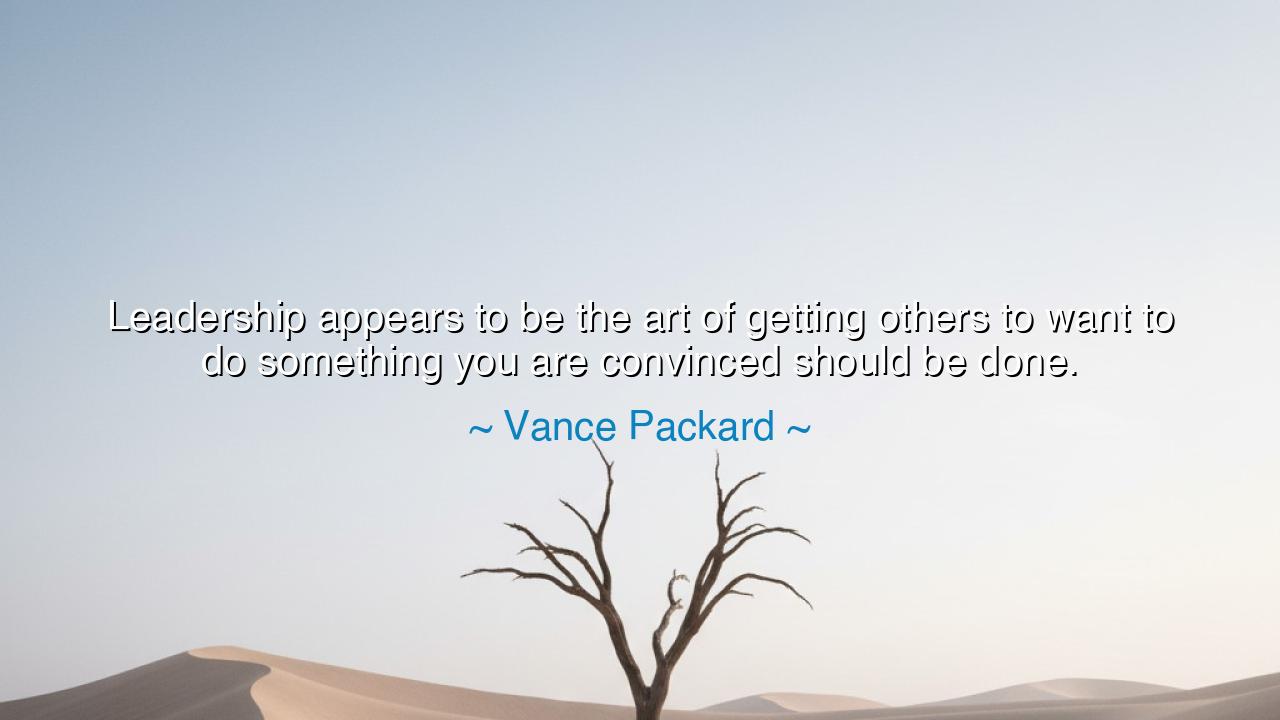
Leadership appears to be the art of getting others to want to do
Leadership appears to be the art of getting others to want to do something you are convinced should be done.






“Leadership appears to be the art of getting others to want to do something you are convinced should be done.” Thus spoke Vance Packard, the chronicler of persuasion and human desire, whose keen eye saw not only the surface of power but the secret machinery beneath it. His words, simple in form yet rich in meaning, uncover the true nature of leadership — not as command, nor as coercion, but as art: the art of awakening within others the will to move, the fire to act, the shared conviction that transforms a single vision into collective purpose.
Packard, who spent his life studying the hidden forces that shape human behavior, understood that leadership begins not with authority but with belief. A true leader does not force obedience; they inspire alignment. They do not drive their followers like a herd; they call them like a song. For when others want to do what you believe must be done, when they make your vision their own, then the work ceases to be a burden and becomes a mission. Leadership, then, is not control — it is influence born of conviction, the mastery of hearts through authenticity.
To grasp the depth of Packard’s insight, one need only look to the story of Mahatma Gandhi, who led not by might or wealth, but by faith. When he called upon his people to resist tyranny through peace, he did not order them; he awakened them. He made them want what he believed was right — freedom through dignity, change through nonviolence. Millions followed him not out of fear, but out of love for his conviction. That is the essence of Packard’s wisdom: to lead is to persuade not the mind alone, but the spirit — to make others feel the truth of your vision so deeply that they carry it as their own.
But Packard’s choice of words — “appears to be the art” — carries a note of humility, for he knows that leadership is no exact science. It is an art, shaped by the mystery of human nature. What inspires one heart may fail to stir another. The leader must be both painter and poet — blending reason and emotion, confidence and compassion. The greatest leaders are those who understand the alchemy of motivation: that people are not machines to be moved by command, but living souls that must be moved by meaning.
In ancient times, Alexander the Great understood this truth. He was not merely a conqueror by sword but by spirit. Before leading his men into battle, he spoke to them not as a king to subjects, but as one soldier to another. He ate their food, slept among them, and shared their pain. Thus, when he called them to march across the deserts of Persia, they followed him not because they feared him, but because they believed in him. He had made his conviction — his dream of a united world — their own. Such is the mark of the leader Packard describes: one who transforms personal conviction into shared destiny.
Yet Packard’s insight also carries a warning. For if leadership is the art of persuasion, it may be used for both creation and destruction. History remembers not only those who inspired for good, but those who manipulated for evil. The same ability to make others “want” what you desire can lead nations to ruin when guided by greed or pride. Thus, Packard’s quote reminds us that true leadership must be grounded in ethics, in the pursuit of what is right, not merely what is possible. The leader’s conviction must not serve the self alone, but the greater good — otherwise, the art becomes deceit, and persuasion becomes tyranny.
The lesson, then, is both noble and demanding: if you would lead, first believe — believe so deeply that your conviction cannot help but kindle belief in others. Speak not merely with words, but with integrity. Act not as one who commands, but as one who invites others to join in purpose. To lead, in Packard’s sense, is to give people ownership of the mission, to make them co-creators in the vision you hold. For only when others want to act — not because they must, but because they choose to — will the work endure beyond you.
Therefore, my listener, remember this eternal truth: leadership is not domination, but inspiration. It is not the voice that orders, but the voice that awakens. The true leader kindles the flame of purpose in others, until the many move as one, not by force, but by faith. And when that harmony is achieved — when hearts beat together toward a single goal — then you will have mastered not the mechanics of power, but the sacred art of leadership itself.






AAdministratorAdministrator
Welcome, honored guests. Please leave a comment, we will respond soon